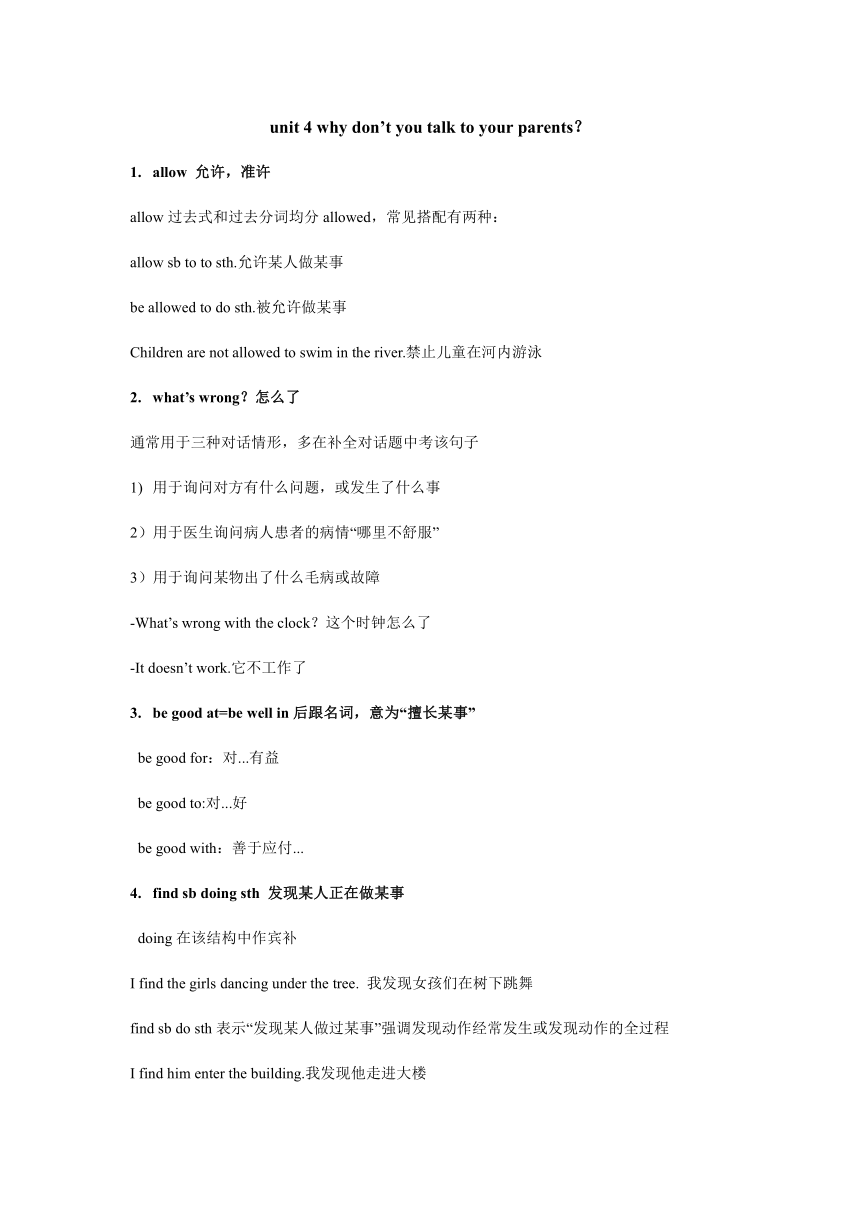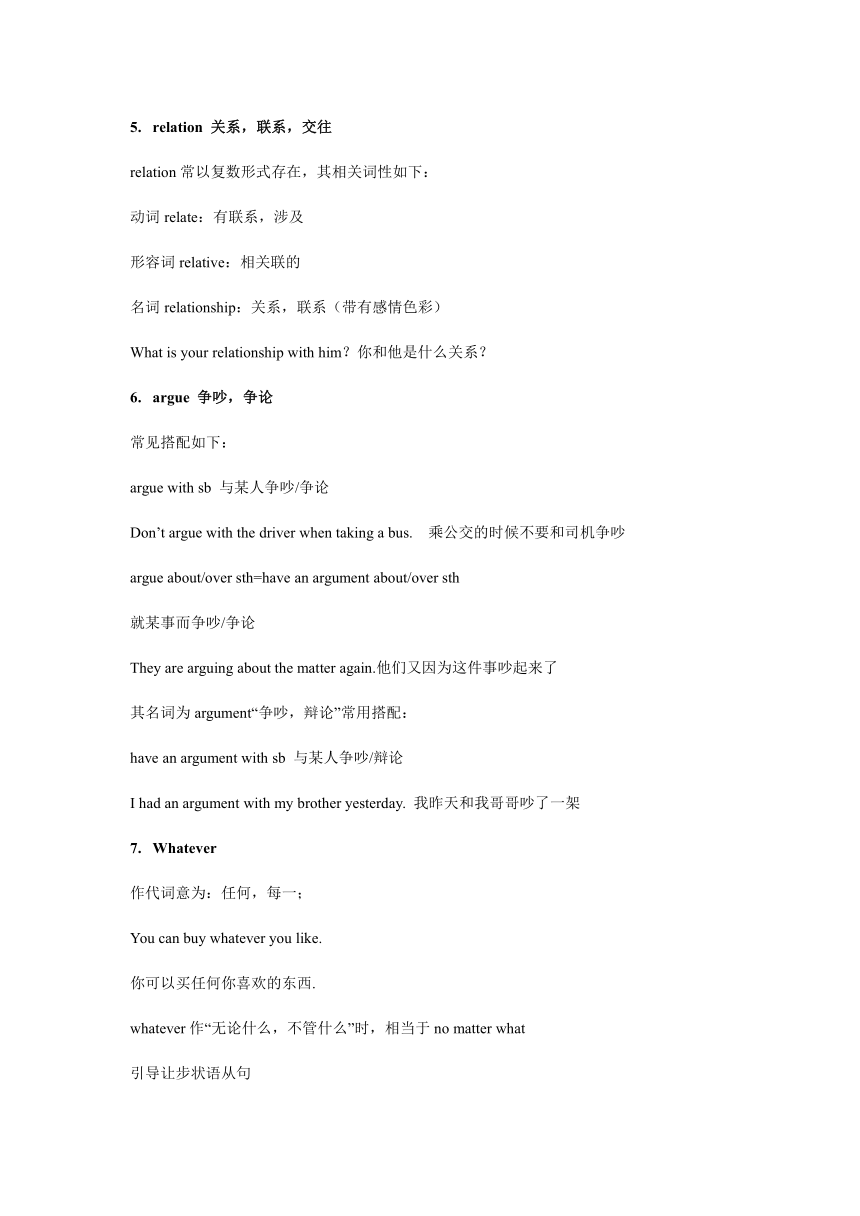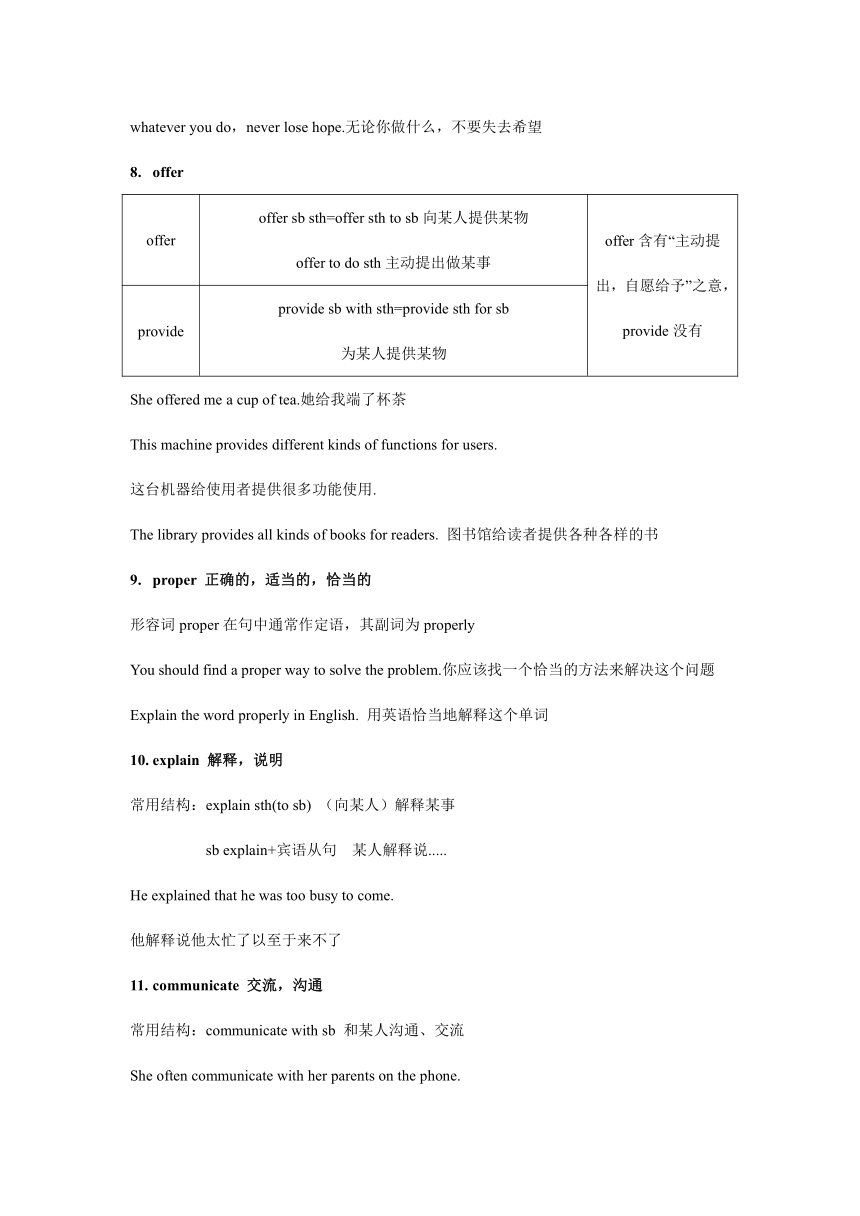Unit 4 Why don't you talk to your parents?单词用法详解
文档属性
| 名称 | Unit 4 Why don't you talk to your parents?单词用法详解 |  | |
| 格式 | docx | ||
| 文件大小 | 21.4KB | ||
| 资源类型 | 教案 | ||
| 版本资源 | 人教新目标(Go for it)版 | ||
| 科目 | 英语 | ||
| 更新时间 | 2024-03-24 18:34:42 | ||
图片预览



文档简介
unit 4 why don’t you talk to your parents?
allow 允许,准许
allow过去式和过去分词均分allowed,常见搭配有两种:
allow sb to to sth.允许某人做某事
be allowed to do sth.被允许做某事
Children are not allowed to swim in the river.禁止儿童在河内游泳
what’s wrong?怎么了
通常用于三种对话情形,多在补全对话题中考该句子
用于询问对方有什么问题,或发生了什么事
用于医生询问病人患者的病情“哪里不舒服”
用于询问某物出了什么毛病或故障
-What’s wrong with the clock?这个时钟怎么了
-It doesn’t work.它不工作了
be good at=be well in后跟名词,意为“擅长某事”
be good for:对...有益
be good to:对...好
be good with:善于应付...
find sb doing sth 发现某人正在做某事
doing在该结构中作宾补
I find the girls dancing under the tree. 我发现女孩们在树下跳舞
find sb do sth表示“发现某人做过某事”强调发现动作经常发生或发现动作的全过程
I find him enter the building.我发现他走进大楼
relation 关系,联系,交往
relation常以复数形式存在,其相关词性如下:
动词relate:有联系,涉及
形容词relative:相关联的
名词relationship:关系,联系(带有感彩)
What is your relationship with him?你和他是什么关系?
argue 争吵,争论
常见搭配如下:
argue with sb 与某人争吵/争论
Don’t argue with the driver when taking a bus. 乘公交的时候不要和司机争吵
argue about/over sth=have an argument about/over sth
就某事而争吵/争论
They are arguing about the matter again.他们又因为这件事吵起来了
其名词为argument“争吵,辩论”常用搭配:
have an argument with sb 与某人争吵/辩论
I had an argument with my brother yesterday. 我昨天和我哥哥吵了一架
Whatever
作代词意为:任何,每一;
You can buy whatever you like.
你可以买任何你喜欢的东西.
whatever作“无论什么,不管什么”时,相当于no matter what
引导让步状语从句
whatever you do,never lose hope.无论你做什么,不要失去希望
offer
offer offer sb sth=offer sth to sb向某人提供某物 offer to do sth主动提出做某事 offer含有“主动提出,自愿给予”之意,provide没有
provide provide sb with sth=provide sth for sb 为某人提供某物
She offered me a cup of tea.她给我端了杯茶
This machine provides different kinds of functions for users.
这台机器给使用者提供很多功能使用.
The library provides all kinds of books for readers. 图书馆给读者提供各种各样的书
proper 正确的,适当的,恰当的
形容词proper在句中通常作定语,其副词为properly
You should find a proper way to solve the problem.你应该找一个恰当的方法来解决这个问题
Explain the word properly in English. 用英语恰当地解释这个单词
explain 解释,说明
常用结构:explain sth(to sb) (向某人)解释某事
sb explain+宾语从句 某人解释说.....
He explained that he was too busy to come.
他解释说他太忙了以至于来不了
communicate 交流,沟通
常用结构:communicate with sb 和某人沟通、交流
She often communicate with her parents on the phone.
她经常打电话和父母交流
communication是其名词,意为:交流,沟通,通信
clear
形容词,有多种含义,其副词为clearly
晴朗的(天气):
The sky is clear and blue.天空晴朗,一片蔚蓝
清澈的:
The water is so clear that we can see the bottom of the lake.湖水清澈见底
明亮的(眼睛):
She has a pair of clear blue eyes.她有一双明亮的蓝眼睛
清晰的(思路),头脑清醒:
I have to keep my head clear for driving home.我必须保持头脑清醒因为我要开车回家
not...anymore 不再
相当于no more,与非延续性动词连用
They don’t live here anymore.他们不再住这里了
He doesn’t need help anymore.他不再需要帮助了
pressure 压力,气压
pressure多指外界施加的压力或者来自工作和生活中的压力,通常是不可数名词,常用搭配:
put pressure on sb 向某人施压
under pressure. 在压力之下
Team A won the game under pressure.A队在压力下赢得了比赛
press是其动词形式,意为“压,按,挤”
I pressed the button and the door opened.我按了下按钮,门开了
compete 竞争,对抗
作不及物动词,常用搭配:
compete with/against... 和..竞争
compete for... 为...竞争
It’s difficult for a small store to compete against a supermarket. 小商店难以和超市竞争
They are competing for the job. 他们在为那份工作竞争
相关词:competition 比赛,竞争;competitor 竞争者,比赛对手
continue 持续,继续存在
作不及物动词时常和with 搭配
作及物动词时构成continue to do sth=continue doing sth“继续做某事”
I went back to my room to continued with my homework.
我返回到房间继续写作业
The rain continued to fall all day.雨持续下了一整天
compare..with 比较,对比
compare...with 把...与...比较 用于两个同类事物之间的比较或对比
compare...to 把...与...比较 与compare...with区别不大
把....比作.... 相当于汉语的比喻
Don’t always compare yourself with others.不要总拿自己和别人比
We usually compare books to friends.我们通常把书比作朋友
cause 导致,引起,造成
常用搭配:
cause sth for sb=cause sb sth “给某人造成某事”(一般指带来麻烦)
cause sb to do sth 导致某人做某事
She is always causing trouble for others.她总是给别人带来麻烦
What caused your dropping out? 是什么原因让你辍学了?
cause作名词意为“原因,理由,事业”
usual 通常的,寻常的
反义词为unusual,不通常的
常用短语as usual“想往常一样,照例”可位于句首或句末
I will meet you at the usual time.我在老时间和你碰头
As usual,he was the last to arrive.就像往常一样,他是最后一个来的
allow 允许,准许
allow过去式和过去分词均分allowed,常见搭配有两种:
allow sb to to sth.允许某人做某事
be allowed to do sth.被允许做某事
Children are not allowed to swim in the river.禁止儿童在河内游泳
what’s wrong?怎么了
通常用于三种对话情形,多在补全对话题中考该句子
用于询问对方有什么问题,或发生了什么事
用于医生询问病人患者的病情“哪里不舒服”
用于询问某物出了什么毛病或故障
-What’s wrong with the clock?这个时钟怎么了
-It doesn’t work.它不工作了
be good at=be well in后跟名词,意为“擅长某事”
be good for:对...有益
be good to:对...好
be good with:善于应付...
find sb doing sth 发现某人正在做某事
doing在该结构中作宾补
I find the girls dancing under the tree. 我发现女孩们在树下跳舞
find sb do sth表示“发现某人做过某事”强调发现动作经常发生或发现动作的全过程
I find him enter the building.我发现他走进大楼
relation 关系,联系,交往
relation常以复数形式存在,其相关词性如下:
动词relate:有联系,涉及
形容词relative:相关联的
名词relationship:关系,联系(带有感彩)
What is your relationship with him?你和他是什么关系?
argue 争吵,争论
常见搭配如下:
argue with sb 与某人争吵/争论
Don’t argue with the driver when taking a bus. 乘公交的时候不要和司机争吵
argue about/over sth=have an argument about/over sth
就某事而争吵/争论
They are arguing about the matter again.他们又因为这件事吵起来了
其名词为argument“争吵,辩论”常用搭配:
have an argument with sb 与某人争吵/辩论
I had an argument with my brother yesterday. 我昨天和我哥哥吵了一架
Whatever
作代词意为:任何,每一;
You can buy whatever you like.
你可以买任何你喜欢的东西.
whatever作“无论什么,不管什么”时,相当于no matter what
引导让步状语从句
whatever you do,never lose hope.无论你做什么,不要失去希望
offer
offer offer sb sth=offer sth to sb向某人提供某物 offer to do sth主动提出做某事 offer含有“主动提出,自愿给予”之意,provide没有
provide provide sb with sth=provide sth for sb 为某人提供某物
She offered me a cup of tea.她给我端了杯茶
This machine provides different kinds of functions for users.
这台机器给使用者提供很多功能使用.
The library provides all kinds of books for readers. 图书馆给读者提供各种各样的书
proper 正确的,适当的,恰当的
形容词proper在句中通常作定语,其副词为properly
You should find a proper way to solve the problem.你应该找一个恰当的方法来解决这个问题
Explain the word properly in English. 用英语恰当地解释这个单词
explain 解释,说明
常用结构:explain sth(to sb) (向某人)解释某事
sb explain+宾语从句 某人解释说.....
He explained that he was too busy to come.
他解释说他太忙了以至于来不了
communicate 交流,沟通
常用结构:communicate with sb 和某人沟通、交流
She often communicate with her parents on the phone.
她经常打电话和父母交流
communication是其名词,意为:交流,沟通,通信
clear
形容词,有多种含义,其副词为clearly
晴朗的(天气):
The sky is clear and blue.天空晴朗,一片蔚蓝
清澈的:
The water is so clear that we can see the bottom of the lake.湖水清澈见底
明亮的(眼睛):
She has a pair of clear blue eyes.她有一双明亮的蓝眼睛
清晰的(思路),头脑清醒:
I have to keep my head clear for driving home.我必须保持头脑清醒因为我要开车回家
not...anymore 不再
相当于no more,与非延续性动词连用
They don’t live here anymore.他们不再住这里了
He doesn’t need help anymore.他不再需要帮助了
pressure 压力,气压
pressure多指外界施加的压力或者来自工作和生活中的压力,通常是不可数名词,常用搭配:
put pressure on sb 向某人施压
under pressure. 在压力之下
Team A won the game under pressure.A队在压力下赢得了比赛
press是其动词形式,意为“压,按,挤”
I pressed the button and the door opened.我按了下按钮,门开了
compete 竞争,对抗
作不及物动词,常用搭配:
compete with/against... 和..竞争
compete for... 为...竞争
It’s difficult for a small store to compete against a supermarket. 小商店难以和超市竞争
They are competing for the job. 他们在为那份工作竞争
相关词:competition 比赛,竞争;competitor 竞争者,比赛对手
continue 持续,继续存在
作不及物动词时常和with 搭配
作及物动词时构成continue to do sth=continue doing sth“继续做某事”
I went back to my room to continued with my homework.
我返回到房间继续写作业
The rain continued to fall all day.雨持续下了一整天
compare..with 比较,对比
compare...with 把...与...比较 用于两个同类事物之间的比较或对比
compare...to 把...与...比较 与compare...with区别不大
把....比作.... 相当于汉语的比喻
Don’t always compare yourself with others.不要总拿自己和别人比
We usually compare books to friends.我们通常把书比作朋友
cause 导致,引起,造成
常用搭配:
cause sth for sb=cause sb sth “给某人造成某事”(一般指带来麻烦)
cause sb to do sth 导致某人做某事
She is always causing trouble for others.她总是给别人带来麻烦
What caused your dropping out? 是什么原因让你辍学了?
cause作名词意为“原因,理由,事业”
usual 通常的,寻常的
反义词为unusual,不通常的
常用短语as usual“想往常一样,照例”可位于句首或句末
I will meet you at the usual time.我在老时间和你碰头
As usual,he was the last to arrive.就像往常一样,他是最后一个来的
同课章节目录
- Unit 1 What's the matter?
- Section A
- Section B
- Unit 2 I'll help to clean up the city parks.
- Section A
- Section B
- Unit 3 Could you please clean your room?
- Section A
- Section B
- Unit 4 Why don't you talk to your parents?
- Section A
- Section B
- Unit 5 What were you doing when the rainstorm came
- Section A
- Section B
- Review of Units 1-5
- Unit 6 An old man tried to move the mountains.
- Section A
- Section B
- Unit 7 What's the highest mountain in the world?
- Section A
- Section B
- Unit 8 Have you read Treasure Island yet?
- Section A
- Section B
- Unit 9 Have you ever been to a museum?
- Section A
- Section B
- Unit 10 I've had this bike for three years.
- Section A
- Section B
